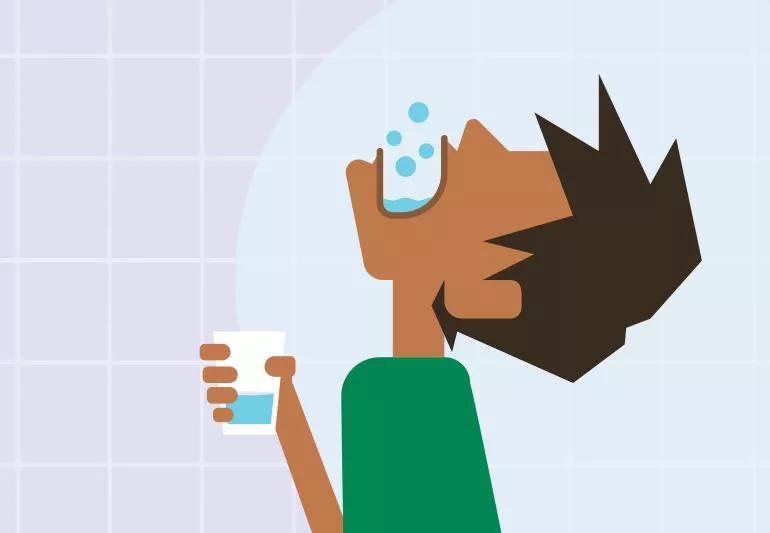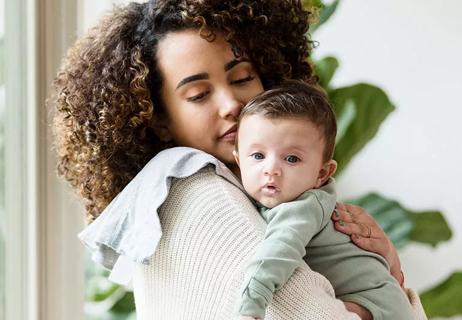Here’s five ways to cut your hiccups short

Most people have experienced the annoying, sometimes quite noisy condition known as hiccups. But why do they happen? And more importantly, what can you do to get rid of them?
Advertisement
Cleveland Clinic is a non-profit academic medical center. Advertising on our site helps support our mission. We do not endorse non-Cleveland Clinic products or services. Policy
Remedies for stopping hiccups are about as mysterious as hiccups themselves. While there isn’t much research that tells us how exactly to stop them, there are some natural remedies that may help.
Family medicine physician Daniel Allan, MD, explains what hiccups are and some natural ways of giving them the boot.
Centuries ago, people claimed hiccups meant a growth spurt for children. Today, we understand the mechanics of a hiccup: When your diaphragm — a muscle situated between your lungs and stomach — becomes irritated, it begins to spasm. This spasm causes what is commonly known as hiccups.
“Hiccups happen when there’s a disturbance in the nerve pathways that lead from the brain to the diaphragm,” explains Dr. Allan.
Part of remedying hiccups is knowing what might trigger them. Believe it or not, the things that can set off a series of hiccups can range from what you consume to your environment. They can be caused by things like eating too quickly, drinking carbonated beverages or even when you feel overly excited or anxious.
It’s unclear if hiccups have a physiologic role. “In the uterus, hiccups may be a programmed exercise of the lungs to help with breathing,” Dr. Allan adds.
You’ve probably heard about numerous remedies for curing hiccups, but none has any scientific basis, experts say. However, some anecdotal evidence suggests that an increase in carbon dioxide may help.
Advertisement
Here are a couple ways to halt your hiccups:
Hiccups also come with a variety of other, slightly weirder techniques that are suggested mostly by anecdotal evidence. Obviously, the success rate of these options depends on each person.
But here are some to try:
Is it your baby who’s having a bad case of the hiccups? Whether it’s gassiness or taking breaths too quickly, your newborn may run into some hiccups of their own.
Advertisement
Some simple ways to relieve your baby of hiccups include changing their feeding position, burping them more often or even giving them a binky to suck on.
The good news is that hiccups are usually short-lived.
However, if you have persistent hiccups that last for several days or more, see a doctor. This may indicate the presence of a medical issue that needs attention. “Sometimes, certain diseases or even a medical procedure, especially those involving anesthesia, can cause prolonged bouts of hiccups,” Dr. Allan notes.
But it’s more common for hiccups to go away on their own. If you don’t want to wait them out, give these tips a try!
Advertisement
Learn more about our editorial process.
Advertisement

What causes newborn hiccups — and how to stop them

Prescription oral antivirals are your best bet, but OTC creams can help, too

These red, raised bites often show up in a zigzag pattern on areas of your skin that come into contact with bedding

Some things you find in your house have antifungal properties — but that doesn’t mean they’ll clear your toenail fungus

Home remedies are unlikely to cure your contagious foot fungus — and they might even make it worse

Earlobe piercings heal quicker and are less painful than cartilage piercings — proper cleaning and care are important

Having a PCP means knowing where to go for a range of concerns — that’s a good thing for your lifelong health

Over-the-counter pills, powders, extracts and tinctures can interact with other medications and cause unexpected side effects

If you’re feeling short of breath, sleep can be tough — propping yourself up or sleeping on your side may help

If you fear the unknown or find yourself needing reassurance often, you may identify with this attachment style

If you’re looking to boost your gut health, it’s better to get fiber from whole foods